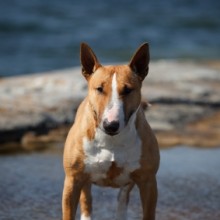Bull Terrier
Lifestyle Needs

The Bull Terrier is a medium sized, muscly dog who needs firm handling. He will be loyal and faithful to his family and is usually fine with humans, but may not be friendly to other dogs. This is a tough, challenging dog with a very macho image who needs an experienced owner. Ideally he should live in a house with a garden and have twice daily exercise. His short coat needs grooming occasionally.
Genetic Diversity
(Known as Coefficient of Inbreeding: 'COI'. It should be as low as possible.)
The UK Kennel Club breed average COI is 14.8% - See 'A Beginners Guide to COI'
Gene Pool Size
(Known as Effective Population Size: 'EPS')
41.9
EPS is a measure of how many individuals are contributing genetically to a breed population. It is a measure of the size of the gene pool in a breed. Lower than 100 is considered critical by conservationists and below 50 brings a breed close to extinction. For more information see the Kennel Club article.
Health and Welfare Problems due to Conformation
(Body shape and physical characteristics)
- The Bull Terrier has a nose shape which is not natural for a dog and which through selection has become extreme in some cases.
- Inverted canine teeth (dental malocclusion)
BVA/KC Health Schemes: www.bva.co.uk/chs
- Hip dysplasia: breed 5 year mean score 14 (parents should be lower). Note that very few dogs are hip scored in this breed and the mean score could be lower or higher.
- Eye Scheme: all dogs used for breeding should be examined by an ophthalmologist
Estimated Breeding Values (EBVs) : No EBVs are currently available for this breed
www.thekennelclub.org.uk/about-ebvs
DNA Tests Available
DogWellNet and IPFD Harmonisation of Genetic Testing for Dogs (HGTD)
www.dogwellnet.com/breeds
- Bull Terrier Polycystic Kidney Disease
- Lethal Acrodermatitis (LAD)
Availability of a DNA test does not mean that it is always necessary or even desirable for breeders to use this test.
Other Breed-Specific Health Screening Schemes
- BAER testing
- Heart testing (Aortic stenosis; Mitral valve dysplasia)
- Kidney testing
- Putnam scoring for Patella Luxation
Ask the breeder to show you the certificates for the above tests/screening for both parents. If any of the above tests have not been considered necessary by the breeder (and there may be good reasons), ask her to explain why.
Other Diseases Reported
(For which there are currently no genetic or screening tests for sire or dam)
Allergic Skin Disease
Dental problems caused by misplaced teeth
Ask the breeder about the medical history of the parents, grandparents and great grandparents. Consider carefully whether to purchase a puppy if some of these or other diseases are in the family line.
Ask about the breeder’s policy in cases of serious genetic diseases occurring to your puppy in later life. Good breeders will request to be informed of such events in order to improve future breeding decisions.
You are strongly advised to buy from a breeder who uses (or is prepared to use) the AWF Puppy Contract and Puppy Information Pack (PIP): www.puppycontract.org.uk
The breeder should also be familiar with the CFSG/DBRG Code of Practice for Dog Breeding